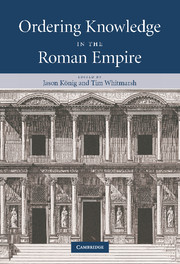Book contents
- Frontmatter
- Contents
- Preface
- Notes on contributors
- List of abbreviations
- Part I INTRODUCTION
- Part II KNOWLEDGE AND TEXTUAL ORDER
- 2 Fragmentation and coherence in Plutarch's Sympotic Questions
- 3 Galen and Athenaeus in the Hellenistic library
- 4 Guides to the wor(l)d
- 5 Petronius' lessons in learning – the hard way
- 6 Diogenes Laërtius, biographer of philosophy
- 7 The creation of Isidore's Etymologies or Origins
- Part III KNOWLEDGE AND SOCIAL ORDER
- Bibliography
- Index
7 - The creation of Isidore's Etymologies or Origins
Published online by Cambridge University Press: 28 August 2009
- Frontmatter
- Contents
- Preface
- Notes on contributors
- List of abbreviations
- Part I INTRODUCTION
- Part II KNOWLEDGE AND TEXTUAL ORDER
- 2 Fragmentation and coherence in Plutarch's Sympotic Questions
- 3 Galen and Athenaeus in the Hellenistic library
- 4 Guides to the wor(l)d
- 5 Petronius' lessons in learning – the hard way
- 6 Diogenes Laërtius, biographer of philosophy
- 7 The creation of Isidore's Etymologies or Origins
- Part III KNOWLEDGE AND SOCIAL ORDER
- Bibliography
- Index
Summary
I believe that almost everyone who uses the book finds it more convenient to have recourse to the Index first.
(John Roget, Introduction to Roget's Thesaurus (1879, 2nd edn), cited by Roget (2002), Introduction, p. xv)Dear Alexander Valkner,
… it was a relief to come across your long, brilliant piece in a recent issue of Comment, namely: The History of Dictionaries.
… From intimacy you travelled to grandeur, then back and forth, like a marvellously controlled metronome. I admired the way your essay builds on itself so meticulously, and the way it is anecdotal, accessible, and, finally, shading toward the confessional. I recognized only too well the moment in which you were tempted to approach some of our great writers to see whether or not they ‘indulge’, keeping a thesaurus hidden in their desk drawer.
(Reta Winters, in Shields (2002), 163–4)When it's ajar …
Almost every publication on Latin literature today practises citation from Isidore. Through the twentieth century, this was a matter of itemic consultation through a modern Index. Until 1991, the closest that many, perhaps most, scholars ever came to reading Isidore's magnum opus was, for sure, the Index verborum of Wallace Lindsay's OCT (1911a), vol. ii, 371–442: Latin, and 443: Greek (with ibid., 444–50: Loci citati). Then, at a stroke, the publication of Robert Maltby's invaluable Lexicon of Ancient Latin Etymologies (1991) finessed this reflex from the Latinist's apparatus of automatic procedures: ‘[M.] has assembled all the explicitly attested etymologies of Latin antiquity, from the predecessors of Varro to Isidore of Seville; he has covered glossaries and scholia as well as the standard ancient etymological source-works.’
- Type
- Chapter
- Information
- Ordering Knowledge in the Roman Empire , pp. 150 - 174Publisher: Cambridge University PressPrint publication year: 2007

